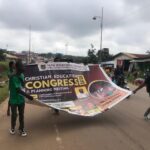by Khaleelah I. L. Harris, 2nd Episcopal District
It was not that long ago. When a presidential election brought about a wave of uncertainty, confusion, and discord. When ideas around my calling and commitment to the Church began to breathe new life into the dried land around me. G-d responded to my ideas and that wave, and Spirit ushered me into the sacred learning community that was Bethune Cookman University’s School of Religion & Philosophy. My dean, the late Randolph “Pop” Bracy, Jr., was our griot. He told many stories with a big booming voice, but there were two stories he told often. He told of the great believer, Dr. Mary Mcleod Bethune. He told of that great gathering of preachers, The Hampton Ministers Conference. According to Dean Bracy, it keeps our fingers on the pulse of the church, reveals possibilities for the church, and is a site at which Spirit leads the church through ideas presented by preachers. He would eventually sponsor a visit for a handful of us, and in June of 2017 the pages of that story multiplied. But there were other storytellers, like my male classmates, who told of the “great” preachers and the great chase that was pursuing fame, notoriety, and self-understanding only the church space could offer.
My calling to The Black Church and the possibilities of my ministry made new grasslands spring up around me. Grasslands filled with herbs, plants, flowers, and trees–surrounded by the waters. At this same time, a new wave of political, cultural, and religious conservatism would hit the land. New guiding texts named after the year of its implementation were in the final stages of editing, and new doctrine was being presented. It was as if the new administration saw those open fields and sought to enclose them. I left my first Hampton Ministers Conference with countless reflections on what I witnessed and new visions for my ministry. That moment was defined by multiple realities of this in and outside my community, the places I frequented, all that I understood to be true, and my spiritual center–all of this crashing together to justify my call to critical witness. Eventually, the tale of that great gathering of preachers would bend the confines of genre yet again and became an epic. Epics, in their didacticism and beauty, lead us to the physical and non-physical sites where Spirit hovers. It was in the stories of The Hampton Ministers Conference, and at the conference itself, that I would learn about the murkiness of conviction and the many waterways that flow out the great river of Life.
In 2024 I returned just for a day, driving up with my brother in ministry. I attended my first “Nu Voices” preaching session and went to a lunch for preachers where my calling was hidden in the shadow of the figure, I made the trip with. I got a chance to go to the beach, so I went to the waters. It was there where I heard the big booming voice of that griot we called “pop” asking me to keep my fingers on the pulse of the church, witness the possibilities of the church, and see what ideas were leading this group of believers. I stood flat-footed, looked up briefly into the sun, and made a promise to return the next year. I would return with intentions to make note of the moment, the church’s response to the moment, and the progress of the black church.
I did just that and returned as a licentiate in the African Methodist Episcopal Church, by way of the 2nd District, the Washington Conference, and Metropolitan AME Church. To my surprise, this year’s lecturer was a pastor in the AME Church, the largest AME church in my conference. I glided toward my seat in full support of AME representation at such a gathering. “Jesus is The Question,” he entitled it, introducing his title with the point that Jesus asked 307 questions, was asked 183 questions, and only answered 3. The “lecturer” began his strange message with a metaphor. Followers of Christ often place him in a neat box so they can’t be challenged by who and what Christ actually is. I sat up, aroused by the idea of potentially hearing a message that encouraged other ministers to lean into inquiry, critical assessment, and deconstruction. The next 45+ minutes were a rollercoaster ride made fantastical by the twists and turns of intellectual dishonesty, the dips and rises of homophobic dog whistles, and the rapidity of that beloved Black preacher cadence. His call to action was that we renew our allegiance to biblical fundamentalism and nullify our contracts with queering of any kind. It was a particularly queerphobic message. He equated right-wing Christian nationalism with progressive theology—framing both as distortions of the gospel. Pride in the pews, affirmation from the pulpit, and new ways of interrogating the text became the signs of dangerous progress. I had never heard such a lecture in person before, and according to a few of his parishioners, they had never heard him give such a message either. At the final morning service his lecture offered a message that encouraged ministers to avoid measuring the progress of the believer once we’ve done the work of bringing them to Christ. We ought to focus on “properly” measuring success. Personal piety, not the eradication of apartheid systems. Straight paths, not queer orientations. Biblical fundamentalism, not sitting at the right hand of Mystery. Who and what was he responding to? He made meaning and redefined ideas all throughout his lectures. And yet, according to him, he was no philosopher. According to him, his teachings were not mere philosophy, he spoke the Truth, and his Truth was “of Christ.” By the end of his lecture, I realized he had asked us to remove Christ from the neat boxes we’d placed him in so we could swap places.
The Christian Recorder contributor, George Anthony Pratt brilliantly posed the question, “will African Methodism rise again?” I now ask, can African Methodism rise higher than the interests of the ruling class? Will African Methodism work alongside the state to quell the queering of society? Is African Methodism equipped to survive this moment, or will it just make church great again? We cannot preach and teach Christ without being honest about what we mean when we say Christ and how we are using Christ to engender change in the church and larger society. With its endless definitions, “Christ” means everything and nothing at all. Therefore, we must be honest about why we’ve chosen to define that great name and how we use that word to build worlds. What did that moment have to be and what does progress have to mean for the lecturer? Why is this so? How exactly do we measure progress for African Methodism through a moment like the 111th Hampton Ministers Conference? I left my second Hampton Ministers Conference with countless reflections on what I had witnessed and new visions for my ministry. Sadly musing, I rode back to DC and caught an update from the 2nd Episcopal District of the AME Church’s Facebook page calling us to “joyfully celebrate and congratulate” the lecturer and the other preachers and performers “who represented the Second District with excellence through preaching, lecturing, and music.” I scrolled past it to find status update from a young Baptist minister who shared an excerpt from Anne Frank’s diary: “Terrible things are happening outside. At any time of night and day, poor helpless people are being dragged out of their homes…Everyone is scare





